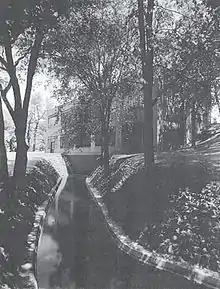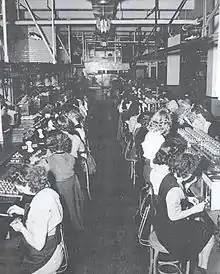
Phoenix Mill was part of Henry Ford's Village industries project and ran from 1922 to 1948 in Plymouth, Michigan.[1]: 162 Generator cutouts, voltage regulators, gauges and light switches for Ford vehicles were produced at the plant.[1]: 162
After the original gristmill burned down, Ford bought the site and commissioned Albert Kahn to design a new mill in 1921.[1]: 35 Ford intended the factory to run entirely on a hydroelectric generator.[1]: 37


Employees
Workers at Phoenix Mill were mostly women, with male maintenance workers and a male manager.[1]: 42 Before the union, women who were hired had to be single, widowed, or married with a husband who was not able to work.[1]: 41 Workers had limited breaks and were under pressure to keep optimum efficiency, but were paid the same or more than men who had similar jobs.[1]: 65
Status
Ownership of the mill eventually passed to Wayne County. The building was used only for storage for decades.[2] In 2018, it was sold by Wayne County to a developer, who began converting it into an event space. The pandemic altered the timeline and plans, but the banquet center opened in 2022. The second floor was converted into offices.[3]
Notes
- 1 2 3 4 5 6 7 Howard E. Segal (2005). Recasting the Machine Age: Henry Ford's Village Industries. University of Massachusetts Press. ISBN 978-1-55849-481-7.
- ↑ David Veselenak (December 13, 2018). "Wayne County looks to sell historic mills, have them redeveloped for 21st century". Hometown Life.
- ↑ David Veselenak (March 16, 2022). "The Phoenix Mill in Plymouth once manufactured Henry Ford's auto parts. Now its a banquet center". Hometown Life.
Further reading
The University of Michigan-Dearborn Center for the Study of Automotive Heritage